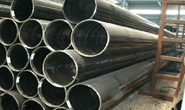Government/Policy

May 1, 2018
Country-of-Origin Appeal Ruling Favors Steel Mills
Written by Sandy Williams
A ruling that will assist in the enforcing measures against circumvention was approved this week by the U.S Court of Appeals for the Federal Circuit. The court ruled that the “substantial transformation analysis” is approved for use by Commerce in determining country-of-origin for products subject to antidumping and countervailing duties. The substantial transformation test determines if a product from one country is substantially changed by processing done in another country, thereby changing its country-of-origin designation. The ruling was a win for U.S. steel companies that presented the appeal to the court.
Bell Supply challenged a Commerce Department ruling in 2014 that green tubes produced in China and finished as OCTG in third countries were “not substantially transformed during the finishing process, even if that process includes heat treatment” and, therefore, were still products originating in China.
Bell Supply won its case after the CIT ruled that substantial transformation analysis was an inappropriate tool for determining whether importers were circumventing AD/CVD duties. Commerce instead was required to conduct a circumvention inquiry under Title 19 § 1677j of the U.S. Code of Federal Regulations before imposing AD/CVD restrictions on products imported from countries not identified in the order.
Explains Inside U.S. Trade, “That provision prevents importers from avoiding AD or CVD orders by routing merchandise through a third country and applies to ‘merchandise imported into the United States [that] is of the same class or kind as any merchandise produced in a foreign country that is the subject of’ an AD or CVD order, and is assembled or completed in a third country not subject to the order.” The CIT ruling was remanded back to Commerce.
In 2015, Commerce again ruled that AD/CVD duties applied to OCTG made from green tubes even when finished in a third country. Bell Supply appealed again and CIT ruled Commerce’s use of substantial transformation analysis renders § 1677 “superfluous” because the test is “an agency-created device to achieve the same purpose.”
In a second redetermination, Commerce ruled that OCTG finished in a third country should not be subject to AD/CVD orders. That decision was promptly appealed by U.S. steel companies who produce OCTG.
The U.S. Court of Appeals said it in its decision last week that it disagreed with CITs interpretation of “products finished in countries subject to AD or CVD orders, and products finished in third countries.” In its opinion, the court said, the substantial transformation test determines whether “the product ‘loses its identity and is transformed into a new product having a new name, character and use,’” as a result of manufacturing. The court vacated and remanded the case back to CIT.
“We conclude that Commerce is entitled to use the substantial transformation analysis to determine country of origin before resorting to the circumvention inquiry,” said the court in its opinion. “Where an imported article is ‘from’ can be an inherently ambiguous question. Because a single article can be assembled from various components and undergo multiple finishing steps, Commerce must have some way to determine the country of origin during scope inquiries.”
The opinion went on to say that, “even if a product assumes a new identity, the process of ‘assembly or completion’ may still be minor or insignificant, and undertaken for the purpose of evading an AD or CVD order.”
“This IS a big deal,” commented trade attorney Lewis Leibowitz. “ It establishes a clear road map for the orderly consideration of scope and circumvention issues. Now, the rule seems to be that Commerce must first determine whether imported products are within the scope of an order. Part of that analysis is to determine the country of origin. If Commerce concludes that a product undergoes a substantial transformation in a non-covered country (and Commerce has a different way of looking at this from Customs), then circumvention analysis is necessary to include the product under an order. If the product does not undergo substantial transformation, as Commerce found in Bell Supply, then the product is within the scope of the order and circumvention analysis is inappropriate.”
Note: Inside U.S. Trade was used as a reference for this article.







